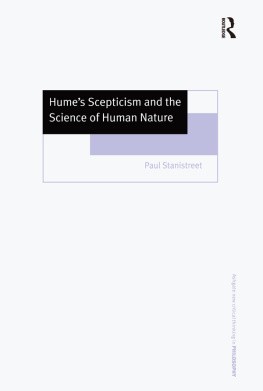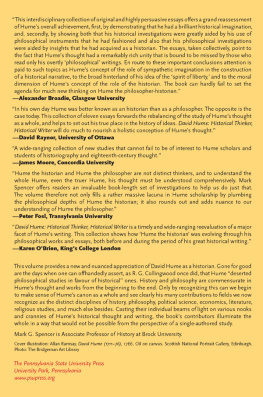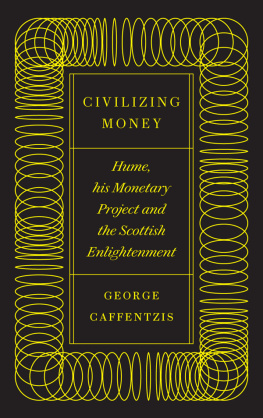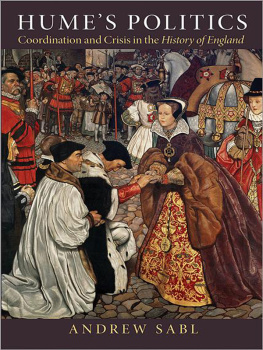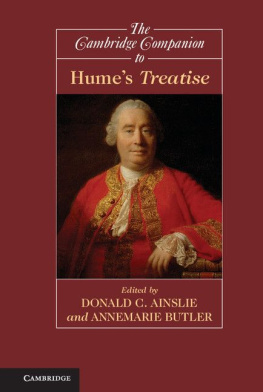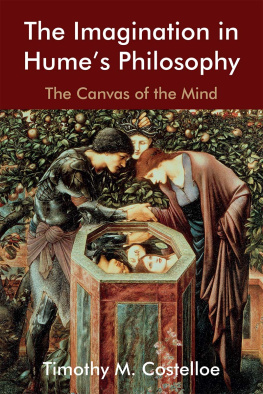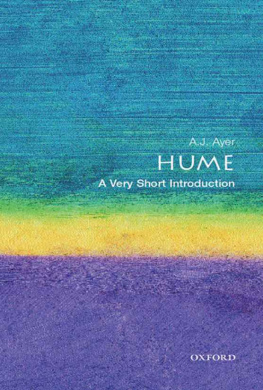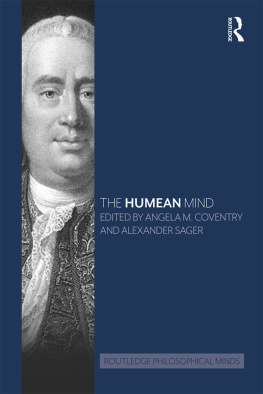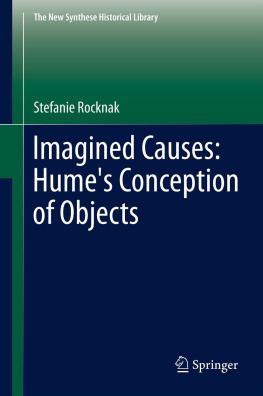
HUMES SCEPTICISM AND THE SCIENCE OF HUMAN NATURE
This book explores the relationship between Humes sceptical philosophy and his Newtonian ambition of founding a science of human nature. Assessing both received and new readings of Humes philosophy, Stanistreet offers a line of interpretation which, he argues, makes sense of many of the apparent conflicts and paradoxes in Humes work and describes how well-known controversies concerning Humes thinking about causation, induction and the external world can be resolved. Stainstreet argues that Humes notorious sceptical arguments are not the episodic outbursts of an unsystematic philosopher, but emerge as part of his attempt to provide science and philosophy with grounds which face up to and withstand the scepticism to which reflective thinkers are naturally prone.
Offering important new contributions to Hume scholarship, this book also surveys and assesses the new research responsible for the recent sea-change in thinking about Hume. It offers an accessible overview of these developments while suggesting significant revisions to current readings of Humes philosophy.
ASHGATE NEW CRITICAL THINKING IN PHILOSOPHY
The Ashgate New Critical Thinking in Philosophy series aims to bring high quality research monograph publishing back into focus for authors, the international library market, and student, academic and research readers. Headed by an international editorial advisory board of acclaimed scholars from across the philosophical spectrum, this new monograph series presents cutting-edge research from established as well as exciting new authors in the field; spans the breadth of philosophy and related disciplinary and interdisciplinary perspectives; and takes contemporary philosophical research into new directions and debate.
Series Editorial Board:
David Cooper, University of Durham, UK
Peter Lipton, University of Cambridge, UK
Sean Sayers, University of Kent at Canterbury, UK
Simon Critchley, University of Essex, UK
Simon Glendinning, University of Reading, UK
Paul Helm, Kings College London, UK
David Lamb, University of Birmingham, UK
John Post, Vanderbilt University, Nashville, USA
Alan Goldman, University of Miami, Florida, USA
Joseph Friggieri, University of Malta, Malta
Graham Priest, University of Queensland, Brisbane, Australia
Moira Gatens, University of Sydney, Australia
Alan Musgrave, University of Otago, New Zealand
Humes Scepticism and the Science of Human Nature
PAUL STANISTREET
University of Glasgow

First published 2002 by Ashgate Publishing
Published 2017 by Routledge
2 Park Square, Milton Park, Abingdon, Oxon OX14 4RN
711 Third Avenue, New York, NY 10017, USA
Routledge is an imprint of the Taylor & Francis Group, an informa business
Copyright Paul Stanistreet 2002
The author has asserted his moral right under the Copyright, Designs and Patents Act, 1988, to be identified as the author of this work.
All rights reserved. No part of this book may be reprinted or reproduced or utilised in any form or by any electronic, mechanical, or other means, now known or hereafter invented, including photocopying and recording, or in any information storage or retrieval system, without permission in writing from the publishers.
Notice:
Product or corporate names may be trademarks or registered trademarks, and are used only for identification and explanation without intent to infringe.
British Library Cataloguing in Publication Data
Stanistreet, Paul
Humes scepticism and the science of human nature. (Ashgate new critical thinking in philosophy)
1. Hume, David, 17111776
I. Title
Library of Congress Control Number: 2002100379
ISBN 13: 978-0-7546-0484-6 (hbk)
For Karen
Contents
The purpose of this book is to provide the reader with an accessible guide to the most significant recent developments in Hume scholarship, while, at the same time, defending a general interpretation of Humes philosophy. I do not pretend to give a full or comprehensive treatment of his philosophical ideas, but instead offer a line of interpretation, a way of reading Hume, which, I believe, makes sense of many of the more puzzling aspects of his thought. The main contention of the work is that by seeing Humes metaphysical and epistemological arguments from this general perspective we can resolve certain well-known interpretive controversies in Hume literature. New Hume scholarship has thrived on these controversies. Most serious scholars now accept that the conventional readings of Humes famous arguments concerning causation, induction and the external world, are flawed and need to be replaced. For those specialising in the philosophy of the eighteenth century, and in eighteenth-century Scottish philosophy, in particular, the past few decades have been an exciting time. A large number of important books and papers have been published, a few of which have radically altered the way in which thinkers such as Hume and his great Scottish contemporary Thomas Reid are viewed. Rigidly-upheld orthodoxies have been challenged and overturned, and, as a result, much new and original research has been able to flourish. It is now possible to see Hume not as the arch-sceptic, the negative and destructive thinker whose main contribution to the history of philosophy was to awaken Kant from his dogmatic slumbers, but as an original and important theorist of human nature, whose true significance to the history of ideas is still to be reckoned with. As my title suggests, this work is concerned with the relationship between Humes scepticism and his theory of human nature. This, in my view, is the central interpretive issue of Hume scholarship. Humes naturalistic science of human nature seems incompatible with scepticism, yet the unequivocally sceptical results of his science of man are such as to lead him to contemplate the abandonment of science and philosophy. Both these dimensions are evidently fundamental to Humes thought. A sound interpretation will allow neither to overwhelm or obscure the other. In my view, Humes notorious sceptical arguments are not the violent, episodic outbursts of an unsystematic thinker, but emerge as part of a deliberate and constructive attempt to provide science and philosophy with grounds which face up to and withstand the scepticism to which reflective thinkers are naturally prone.
My chief text is Book I of Humes first and greatest work, A Treatise of Human Nature. Some explanation of my decision to focus on one section of a single work is demanded. One reason is that Book I has provided the background for many recent skirmishes among scholars of Humes philosophy. It has been the source of many of the most appalling misrepresentations of Humes intentions, but also of their ultimate correction. More importantly, this book, and, in particular, its remarkable closing sections, are, I believe, of the utmost importance to the understanding of Humes philosophy as a whole, comprising, among much else which is rich and original, the grounds and outline of the philosophical project he pursues in Books II and III, and, indeed, throughout much of his subsequent philosophical work. I have not felt it necessary to discuss or comment on every important issue raised in Book I of the Treatise. I mean, instead, to give a broad general view of Humes fundamental philosophical aims and intentions, proceeding, as he does, from key philosophical issues to a number of highly general conclusions. In deference to my view of Hume as a philosopher for whom holistic concerns are paramount, I focus on those arguments which are central to his philosophical outlook, and which inform his general understanding of philosophy. This book, therefore, contains lengthy exegeses of Humes examinations of the metaphysical and epistemological issues concerning causation, induction and the existence of an external world. Despite the complexity and rigour of much of this discussion, I have attempted to write on these issues in a way which does not presuppose any prior knowledge, let alone expertise, on the part of the reader.
Next page
